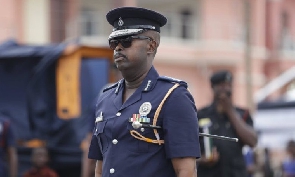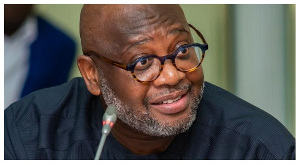By Bernard Asubonteng
It was Tuesday 1, 2013, in one of the Atlanta’s high-end hotels—Ritz Carlton—located in the upscale neighborhood of Buckhead, where I had a rare opportunity to sit in the audience and listened to President John Mahama talked about the excellent investment climate, including the relatively political stability in Ghana. In fact during his address at the hotel, Mr. Mahama said many things about Ghana that might be hard to dispute.
For example, the Ghanaian leader pointed out that Ghana used to be the crossroads of Africa’s independence movements in the 1960s, where a considerable number of the continent’s freedom fighters used as launching-pad for their respective struggle against colonial rule. Mr. Mahama was on point to remind his listeners that Ghana is relatively a stable society; in that, it is one of the few contemporary nation-states in African sub-region that has never been entangled in the web of civil conflict.
The preceding assessment regarding Ghana’s relative stability should be a source of pride. For whichever way some Ghanaians—whether at home or in Diasporas—look at it, they should be proud to hear or know that irrespective of the seemingly vast differences existing internally within the country’s sociopolitical morass, Ghana does not really have strong appetite for civil war; hopefully, not in any foreseeable future.
Admittedly, many a time some segment of Ghanaians have acted as the proverbial goats, raising their disagreement or conflict to the fever-pitch level only to lower it down gently just when one thinks they are about to break each other neck into pieces. Perhaps down deep in average Ghanaian psyche, war, in all its ramifications, not only compound issues but also it is a non-starter in the face of rational thinking and problem solving. Rather, challenging some assumptions and subjecting ideas to the rigors of debate and market place of ideas seem to be average Ghanaian passion and character.
So, driving to the Ritz Carlton Hotel to listen to President Mahama talked about his administration’s vision for Ghana, I had no any illusion at the time that after Mr. Mahama’s speech, there would an open forum for a real “jaw-jaw” instead of “war-war” which had been the bane of many African nations. In other words, the floor would be opened for the audience to comment or ask unrestricted questions based on the speech. After all we have democratic leader and government. My calculations were wrong, because that was not the case. After Mr. Mahama had finished speaking for nearly 30–35 minutes, the moderator or the MC for the event announced that only six questions would be allowed; and, that even those questions that would be asked had already been pre-written or submitted. However, the MC quickly added that it was up to “His Excellency” (whatever that means) if he wanted to take more questions directly from the floor after addressing the pre-written questions. Unsurprisingly, the president didn’t take the bait; after answering the questions, he was gone, because he had a scheduled meeting the next day with the Governor of the state of Georgia.
As I call recall, the pre-submitted questions for President Mahama bordered on dual citizenship, sickle-cell disease in Ghana, the water plastic trashes all over the place, why Mr. Mahama chose to become president, and other two which on critical examination had nothing to do with the lengthy remarks given by the visiting president on that Tuesday night at Atlanta’s upscale suburb. It should be noted that on the dual citizenship, Mr. Mahama strategically deferred it to his accompanying Foreign Minister Ms. Hannah Tetteh to respond, but sorry to say that the minister’s response was incoherent and devoid of any clarity almost the same way as the law itself. It came as no surprise that after her fuzzy explanation, the president had to step in to explain the dual citizenship law much better to ensure clarity on that front. It is ironic, though, that Ms. Tetteh who was born in Szeged, to a Hungarian mother, and perhaps subtly enjoys dual citizenship herself couldn’t give convincing articulation of the value of that law.
At any rate, some of the questions I would have asked President Mahama based on his speech in Atlanta that Ghana is an “emerging economy” or in the process of fast growth and rapid industrialization in most sectors of the country’s economy would have included, “if Ghana’s economy is growing that fast and the growth rate is soaring, why then are many of our brothers and sisters back home are unemployed?”
Again, since Mr. Mahama painted a picture of Ghana almost similar to a “paradise” in the midst of hell in Africa, it would have been a fair game to ask him in an open forum to tell us with straight face the true state of Ghana roads or communication networks befitting fast developing economy. By communications we are not only talking about how almost everyone in Ghana now carries cell phone and can communicate directly from Kejetia or Makola Market to the rest of the country and beyond. Fact is, you cannot seriously claim to belong to the league of “emerging economies” when your nation can’t even boast of first-class roads linking the major cities throughout the country down to its hinterlands. Good roads are one of the most significant components of any serious development. These so-called leaders and “His Royal Excellencies” in Africa know this but almost always just pay lip-service to this all-important element of progress.
On the heels of the foregoing, one of the questions worth asking President Mahama would have been: what is his government’s grand plan toward ensuring the dramatic transformation of most of Ghana’s substandard and accident-prone roads since he argued in his remarks that all the sectors of the country’s economy are rapidly growing like fire in the dry grassland. Alternatively, one other question that came to my mind was the institutionalized corruption in Ghana’s ports of entry and what sustainable role Mahama’s regime is putting in place to fight off this perennial canker.
While President Mahama was hyperbolically overselling Ghana as the current political and economic beacon of Africa, he strangely took an off-the-cuff swipe at the Internet news sites, singling out the GHANAWEB.com that if Ghanaians in Diasporas wanted to know more about the true state of affairs in Ghana, then these websites are not the right place to learn about the country. Here, given the chance in an open forum, I probably would have asked him on what basis did he come to that conclusion? Did he access the site himself regularly or has he detailed someone else to track what is going on in many of these websites?
My last but not the least question would be premised on his assessment that Africa has always been portrayed negatively in the Western media and that some of these portrayals are reinforced and encouraged by Africans themselves. That was a fair point, Mr. President; but, the question is: what would you or are you intend doing to fight this bad media bias and negativity toward Africa and for that matter Ghana?
Every visiting leader to another country tries to extol and portray his or her nation’s success in a positive light to attract tourism and other investments. That is normal. However, if most of the people listening to that leader are nationals of that particular leader’s home country and also fully aware of what is going on there, any misrepresentation or exaggeration of facts makes you cringe. Thus listening to President Mahama talked about Ghana as if it is flowing with milk and honey you wonder why then do many of our relatives back in Ghana keep asking for help or money (whether you have it or not) almost every week or month just to buy something to eat?
Bernard Asubonteng is a media analyst based in Atlanta, GA. He can be reached at: b.asubonteng@gmail.com
Opinions of Thursday, 10 October 2013
Columnist: Asubonteng, Bernard


















